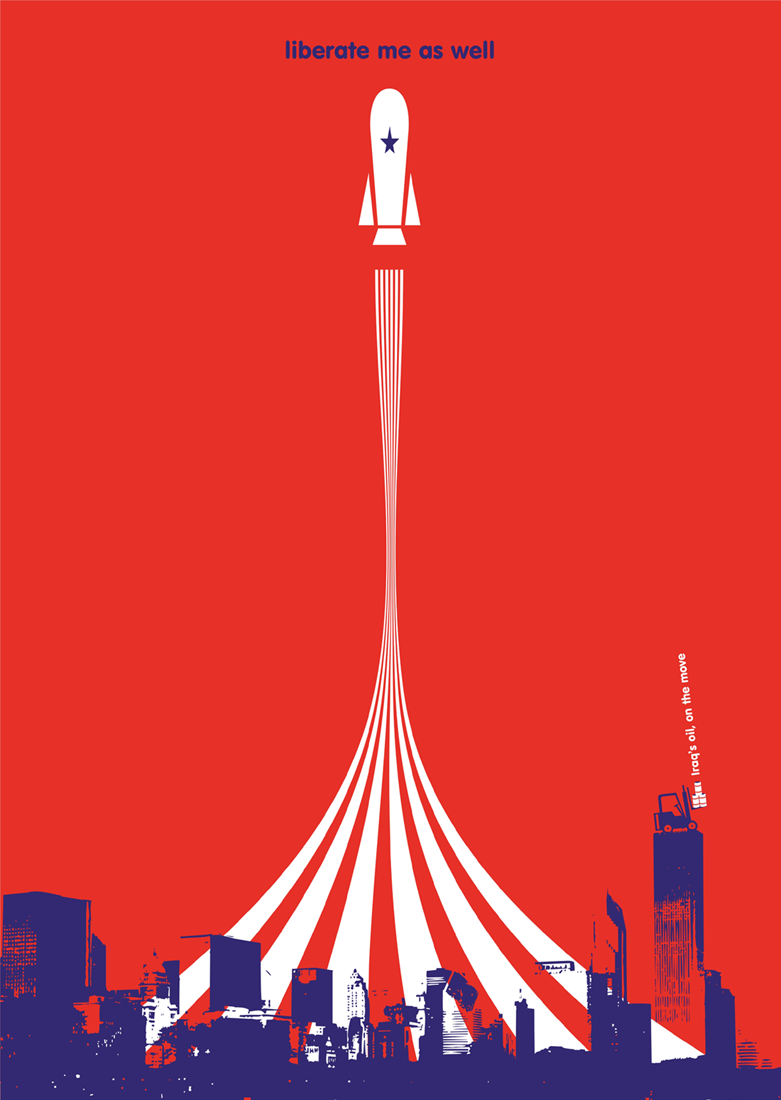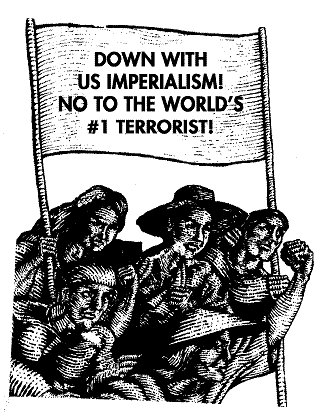 Pax Amercana vs offshore balancing
Pax Amercana vs offshore balancingThe latest jargon justifying imperialism, as if straight from the business page contrasts Pax Americana, where if they behave well, clients become more prosperous and more democratic. If that fails but you have a few reliable regional partners, there is an offshore balancing system, where the empire’s quislings bear the primary responsibility for dealing with crises on the ground, and US military strategy is oriented toward policing the seas and skies. Nothing new except the name. The British were masters of ‘offshore balancing’.
Since the Cold War, and especially since 1991, the Pax Americana idea has predominated. But in the Middle East, Dohat lectures, there has been no real evolution toward democracy among our network of allies; instead, their persistent corruption has fed terrorism and contributed to al-Qaeda’s rise. All is the fault of the stupid, greedy towel heads. Apparently Bin Laden can’t see the difference between local and foreign greedy bastards.
Hence the Bush administration’s post-9/11 decision to try to “start afresh, by transforming a rogue state into a regional model”, a foundation for a new American-led order that would be “less morally compromised than the old”. That order did not, of course, emerge. Instead, the obliteration of Iraq destroyed the only vaguely functional regime in the Middle East, killing 100,000s of innocent Iraqis (who knows how many? According to the invader chief, General Tommy Franks, “We don’t do body counts).
A “different bad actor”, Iran, ended up empowered, which in a sense led to the Arab Spring and the civil wars that followed. Iran is the only Muslim country that has successfully resisted imperialism, and as such was an inspiration to Muslims both Shia and Sunni.
Withdrawal from Iraq and a “ light-footprint approach to counterterrorism”, the “strange dance with Bashar al-Assad”, “limited intervention against ISIS” all aim at a more “offshore” approach to the Middle East’s problems according to the shamelessly sycophantic guru of US atrocities Dohat. Likewise, the long-sought détente with Iran, which Dohat vainly hopes will push Tehran to join Riyadh, Cairo and Tel Aviv in a “multipolar order”.
The US ‘matures’
The US has been shaping imperialism—the Great Games—even before the eclipse of the British Empire as a result of WWI. The US was a junior player, but admired as the up-and-comer by Kipling, who wrote his most famous paean to imperialism “the white man’s burden” not in reference to the genocidal Boer War, but to the US war against the Philippines, where 10,000 of
 rebels had just defeated the Spanish in a war of independence and were duly dispatched by US forces, gunned down by nifty new machine guns.
rebels had just defeated the Spanish in a war of independence and were duly dispatched by US forces, gunned down by nifty new machine guns. Kipling justified the US slaughter as a noble enterprise: Go bind your sons to exile To serve your captives’ need;... [in] The savage wars of peace. (first published in McClure 1899) The real US policy was the Monroe Doctrine (1823), promoting the idea of national and continental self-sufficiency and the drive for hegemony by the dominant power as much for supremacy as for economic interest. Poor Mexico, poor Cuba … but poor Philippines?
Apparently the conflicts over the years have had nothing to do with US aggression, despite the fact that the venerable FDR—icon of the liberals—created the Saudi monster in the 1930s (and had assassinated more than one Latin American leader), proto-Israel plotted brilliantly from the 1930s for ethnic cleansing and just plain murder of the natives in the Zionist zeal to create a Disney ‘Holy Land’ (what must God be thinking). ISIS is not a result of the Bushes obliterating Iraq, but an age-old grudge match between Sunni and Shia.
Islamic politics
Meanwhile, the local Muslims have been praying devoutly five times a day, celebrating the grueling Ramadan fast, but increasingly worried about the schemes plotted against their lands, which raised the alarm of jihad.
The first instance of the root word j-h-d in the Quran is: “Therefore do not obey the negators, but strive against them with the Quran. (25:52) The only clear call to armed jihad in the Quran is when you are directly attacked: it then is an ‘individual duty’ (fard ayn) to fight to defend yourself and your community. “To those against whom war is made, permission is given to fight, and ... [to] those who have been expelled from their homes in defiance of right for no cause except that they say: ‘Our Lord is Allah!’” (22:39–40)
The wars against Israel in 1948 and 1973 were fard kifayah, which the community as a whole was pressed to support, announced by the Muslim leaders (in lieu of the absent Caliph). But the organizer of the boycott, Saudi King Faisal (the only Saudi monarch deserving respect), was abandoned by his Arab allies and assassinated in 1975 by his half-brother’s son, Faisal bin Musaid, who had just come back from studies in the US. He was replaced by the more compliant King Fahd, who went as far as accepting a permanent US military presence on Saudi territory.
The disillusion from these intrigues and wars grated on all Muslims, who came to the logical conclusion that their Muslim rulers were serving imperialism and Israel, not Islam, The result was an underground fard ayn, relying on the Quran, but without clear authority. Self-styled theorists like Qutb and Osama Bin Laden, brilliant and charismatic scholar/activists, considered ways to fight the kufar, so insolently lording it over the ummah, forcing its degenerate culture on their children, educating its scholars in American secularism, filling its airwaves with pornography, violence, and even ridicule of the Prophet Muhammad.
Islam looks for ways of diffusing conflict even when neither side is ‘correct’, a timeless truth which the Dohats are unable to fathom. Political power is central to Islam; you can’t relieve oppression/ injustice if you are weak.
Prophet Muhammad was a brilliant political strategist, and went from simple trader to head of a powerful new socio-political and religious formation in a few decades. Prophet Muhammad was the first to build a political formation from scratch, providing a template for any future Islamic society. The prophetic mission lasted 23 years, and the next 10 years saw the rapid triumph of Islam throughout the Arabian Peninsula, the result of careful planning, strategic alliances, and judicious use of force to neutralize the power of enemies without wholesale destruction or massacres.
What is important is to preserve the sanctity of Islam in the face of schemes to undermine it. This is exactly the situation today. ISIS and the Houthi must work with Shia and all other sincere Muslims—this requires compromise from all sides—to expel the US and end the Saudi complicity with the US and Israel. If the Saudi rulers can risk throwing in the towel, there is no need for a Saudi revolution. Revolutions are always messy. Best to find compromise.
Liberal crocodile tears
Western liberals crow about ISIS beheadings (it’s actually considered to be more humane than such western practices as electrocution (or death by drone)). What really bugs me is when western media claim that the beheading is used as entertainment for the towel heads. The beheading is officiated by an imam who explains the reason for the beheading (usually treason or fornication). It’s not our cup of tea, but who cares what western liberals on CNN think, except other western liberals? What good have western liberals EVER done in the world of politics.
Recall the 1930s, when liberals denounced Stalin for killing people, some of whom were no doubt saboteurs, but like today in Iraq, many of whom were just unenthusiastic about his socialism, caught in the crossfire. Stalin had good reason to be paranoid about his ‘liberals’. The West invaded Russia in 1918 and again in 1941, and after WWII, constantly threatened to ‘liberate’ the socialist bloc, engaging in countless acts of sabotage to bring the anti-imperialist rival system down.
So where are western liberals in all this, supposedly concerned about human rights, about protecting us all from violence? In the 1930s–1940s, they became fanatical anti-communists, earning their keep from the CIA et al, and eventually morphing into the neocons.
Today, apart from a few saints like Ralph Nader, they are like a chorus of harpies, supporting the US bombing of just about any resistance fighter in Syria and Iraq, no matter whether Sunni or Shia, and for over a decade, the fearless Taleban, who have endured untold torture and death at US hands, and miraculously have endured, awaiting the final helicopter escape of US troops.
 There is no need to quibble over ISIS’s crude social justice. They are the paranoid offspring of the invasion, and will only quieten down when the hateful invader is gone. Genuine conservatives (not the neos) are anti-imperialist if only because conflict is bad for business and the money men are smart enough to realize it undermines US influence around the world. Grover Cleveland (22nd and 24th president) opposed the Spanish and Philippine Wars, and was a member of the Anti-Imperialist League. Bill Kaufman, Pat Buchanan, and Ron Paul all spoke strongly against the Iraq war.
There is no need to quibble over ISIS’s crude social justice. They are the paranoid offspring of the invasion, and will only quieten down when the hateful invader is gone. Genuine conservatives (not the neos) are anti-imperialist if only because conflict is bad for business and the money men are smart enough to realize it undermines US influence around the world. Grover Cleveland (22nd and 24th president) opposed the Spanish and Philippine Wars, and was a member of the Anti-Imperialist League. Bill Kaufman, Pat Buchanan, and Ron Paul all spoke strongly against the Iraq war. Of the major Western antiwar organizations, United for Peace and Justice has never supported the insurgency, and Act Now to Stop War and End Racism and the Stop the War Coalition have sat on the fence in quintessential liberal fashion. Most organizations fret over the rebels’ crude insurgency, ignoring the real devil, showing their unprincipled cowardice. If a million protestors went to the Pentagon and refused to budge till the bombing stopped and the troops were leaving, THAT would be courageous—and doable—for sincere activists.





